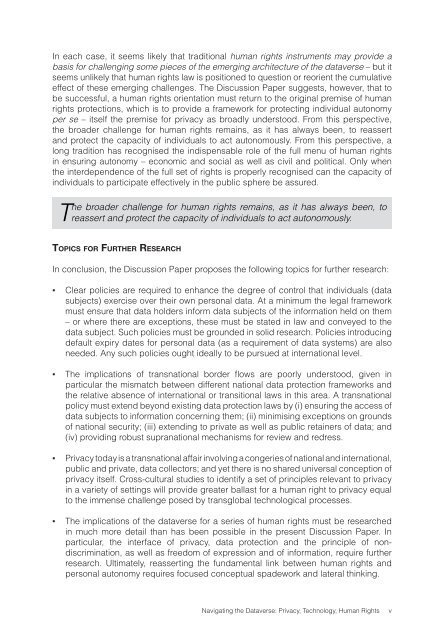Navigating the Dataverse: Privacy, Technology ... - The ICHRP
Navigating the Dataverse: Privacy, Technology ... - The ICHRP
Navigating the Dataverse: Privacy, Technology ... - The ICHRP
Create successful ePaper yourself
Turn your PDF publications into a flip-book with our unique Google optimized e-Paper software.
In each case, it seems likely that traditional human rights instruments may provide a<br />
basis for challenging some pieces of <strong>the</strong> emerging architecture of <strong>the</strong> dataverse – but it<br />
seems unlikely that human rights law is positioned to question or reorient <strong>the</strong> cumulative<br />
effect of <strong>the</strong>se emerging challenges. <strong>The</strong> Discussion Paper suggests, however, that to<br />
be successful, a human rights orientation must return to <strong>the</strong> original premise of human<br />
rights protections, which is to provide a framework for protecting individual autonomy<br />
per se – itself <strong>the</strong> premise for privacy as broadly understood. From this perspective,<br />
<strong>the</strong> broader challenge for human rights remains, as it has always been, to reassert<br />
and protect <strong>the</strong> capacity of individuals to act autonomously. From this perspective, a<br />
long tradition has recognised <strong>the</strong> indispensable role of <strong>the</strong> full menu of human rights<br />
in ensuring autonomy – economic and social as well as civil and political. Only when<br />
<strong>the</strong> interdependence of <strong>the</strong> full set of rights is properly recognised can <strong>the</strong> capacity of<br />
individuals to participate effectively in <strong>the</strong> public sphere be assured.<br />
<strong>The</strong> broader challenge for human rights remains, as it has always been, to<br />
reassert and protect <strong>the</strong> capacity of individuals to act autonomously.<br />
Topics for Fur<strong>the</strong>r Research<br />
In conclusion, <strong>the</strong> Discussion Paper proposes <strong>the</strong> following topics for fur<strong>the</strong>r research:<br />
▪<br />
▪<br />
▪<br />
▪<br />
Clear policies are required to enhance <strong>the</strong> degree of control that individuals (data<br />
subjects) exercise over <strong>the</strong>ir own personal data. At a minimum <strong>the</strong> legal framework<br />
must ensure that data holders inform data subjects of <strong>the</strong> information held on <strong>the</strong>m<br />
– or where <strong>the</strong>re are exceptions, <strong>the</strong>se must be stated in law and conveyed to <strong>the</strong><br />
data subject. Such policies must be grounded in solid research. Policies introducing<br />
default expiry dates for personal data (as a requirement of data systems) are also<br />
needed. Any such policies ought ideally to be pursued at international level.<br />
<strong>The</strong> implications of transnational border flows are poorly understood, given in<br />
particular <strong>the</strong> mismatch between different national data protection frameworks and<br />
<strong>the</strong> relative absence of international or transitional laws in this area. A transnational<br />
policy must extend beyond existing data protection laws by (i) ensuring <strong>the</strong> access of<br />
data subjects to information concerning <strong>the</strong>m; (ii) minimising exceptions on grounds<br />
of national security; (iii) extending to private as well as public retainers of data; and<br />
(iv) providing robust supranational mechanisms for review and redress.<br />
<strong>Privacy</strong> today is a transnational affair involving a congeries of national and international,<br />
public and private, data collectors; and yet <strong>the</strong>re is no shared universal conception of<br />
privacy itself. Cross-cultural studies to identify a set of principles relevant to privacy<br />
in a variety of settings will provide greater ballast for a human right to privacy equal<br />
to <strong>the</strong> immense challenge posed by transglobal technological processes.<br />
<strong>The</strong> implications of <strong>the</strong> dataverse for a series of human rights must be researched<br />
in much more detail than has been possible in <strong>the</strong> present Discussion Paper. In<br />
particular, <strong>the</strong> interface of privacy, data protection and <strong>the</strong> principle of nondiscrimination,<br />
as well as freedom of expression and of information, require fur<strong>the</strong>r<br />
research. Ultimately, reasserting <strong>the</strong> fundamental link between human rights and<br />
personal autonomy requires focused conceptual spadework and lateral thinking.<br />
<strong>Navigating</strong> <strong>the</strong> <strong>Dataverse</strong>: <strong>Privacy</strong>, <strong>Technology</strong>, Human Rights
















